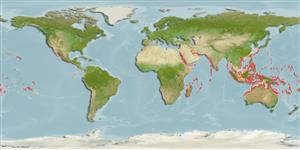Environment: milieu / climate zone / depth range / distribution range
Ecologia
marinhas associadas(os) a recifes; intervalo de profundidade 1 - 30 m (Ref. 30573). Tropical; 32°N - 30°S
Indo-Pacific: Red Sea to Sodwana Bay, South Africa and to the Society Islands, north to the Ryukyu Islands, south to New Caledonia. Records from the Mascarene Islands lack verification and are probably based on Pterois antennata (Ref. 33390).
Tamanho / Peso / Idade
Maturity: Lm ? range ? - ? cm
Max length : 24.0 cm TL macho/indeterminado; (Ref. 9710); common length : 20.0 cm TL macho/indeterminado; (Ref. 5450)
Espinhos dorsais (total): 11 - 13; Raios dorsais (total): 10-12; Espinhos anais 3; Raios anais : 6 - 7. This species is distinguished by the following characters: usually D XII,11 (rarely XII, 10 or XII, 12) and the pectoral-fin rays 16 (rarely 15, 17 or 18); scale rows in longitudinal series 51-57; relatively long fin days in the dorsal-fin with length of longest 30.9-40.5 (mean 35.8) % of SL, in the anal-fin with longest ray length 35.8-44.8 (40.4) % of SL, in the pectoral fin, the ninth ray length 75.6-113.2 (92.4) % of SL, and in pelvic-fin with longest ray 48.2-71.9 (60.0) % of SL with its posterior tip reaching or extending beyond vertical through posteriormost anal-fin
soft ray base when depressed; supraocular tentacle without lateral branches; the postorbital sensory canal absent or not connected to sphenotic spine base at any life history stage. Colouration: body sides with five broad dark black bands and a horizontal broad dark band on caudal peduncle; the fourth and fifth body bands relatively narrow, dorsal width 5.8-9.3
(mean 7.4) % of SL and 3.4-9.3 (7.3) % of SL, respectively; the fourth additional (inserted) marking relatively broad, dorsal width 2.1-4.9 (3.6) % of SL (Ref. 123589).
A generally uncommon species that inhabits lagoon and seaward reefs (Ref. 9710). Prefers rocky reefs and seems to avoid stony corals. Coastal, sometimes in surge zones where in narrow crevices, or along rock-walls in small caves (Ref. 48635). Found under ledges during the day (Ref. 9710). Feeds exclusively on small crabs and shrimps. Capable of inflicting a painful sting. Minimum depth reported taken from Ref. 30874.
Ciclo de vida ou comportamento de acasalamento
Maturidade | Reprodução | Desova | Ovos | Fecundidade | Larvas
Eschmeyer, W.N., 1986. Scorpaenidae. p. 463-478. In M.M. Smith and P.C. Heemstra (eds.) Smiths' sea fishes. Springer-Verlag, Berlin. (Ref. 4313)
Status na Lista Vermelha da UICN (Ref. 130435)
Uso pelos humanos
Pescarias: pesca de subsistência; Aquário: Espécies comerciais
Mais informação
Nomes comunsSinônimosMetabolismoPredadoresEcotoxicologiaReproduçãoMaturidadeDesovaAgregação de desovaFecundidadeOvosDesenvolvimento dos ovos
ReferênciasAquaculturaPerfil para aquaculturaEstirpesGenéticaElectrophoresesHereditariedadeDoençasProcessamentoNutrientsConversão de massa
Ferramentas
Relatórios especiais
Baixar XML
Fontes da internet
Estimates based on models
Preferred temperature (Ref.
123201): 25.1 - 29.3, mean 28.4 °C (based on 3699 cells).
Índice de diversidade filogenética (Ref.
82804): PD
50 = 0.5005 [Uniqueness, from 0.5 = low to 2.0 = high].
Bayesian length-weight: a=0.01023 (0.00444 - 0.02358), b=3.01 (2.82 - 3.20), in cm total length, based on LWR estimates for this (Sub)family-body shape (Ref.
93245).
Nível Trófico (Ref.
69278): 3.6 ±0.59 se; based on food items.
Resiliência (Ref.
120179): médio(a), tempo mínimo de duplicação da população 1,4 - 4,4 anos (Preliminary K or Fecundity.).
Fishing Vulnerability (Ref.
59153): Low vulnerability (14 of 100).
Nutrients (Ref.
124155): Calcium = 65.9 [34.6, 130.0] mg/100g; Iron = 0.702 [0.371, 1.671] mg/100g; Protein = 18 [16, 20] %; Omega3 = 0.198 [0.087, 0.523] g/100g; Selenium = 24.9 [13.6, 62.4] μg/100g; VitaminA = 209 [70, 584] μg/100g; Zinc = 1.33 [0.91, 1.95] mg/100g (wet weight);
